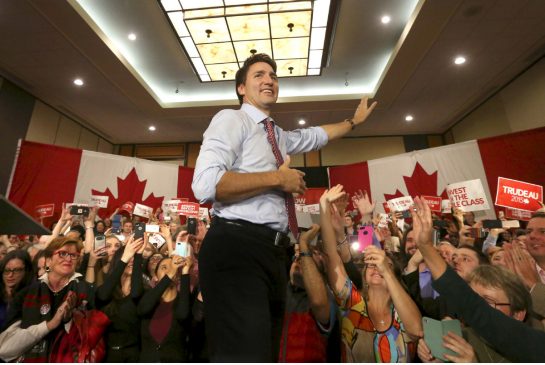Trudeau will break convention, along with some hearts: Tim Harper
Trudeau campaigned from the heart, but governing demands pragmatism. That will disappoint some of his supporters.

CHRIS WATTIE / REUTERS
Prime minister-designate Justin Trudeau takes the stage during a rally in Ottawa last week. Trudeau has huge political capital, but may have some trouble delivering on all of his campaign promises, Tim Harper writes.


OTTAWA—As we look ahead to the Justin Trudeau era, two lessons from his campaign can lead us to two probabilities during his first year in office.
He will break some conventional “rules.’’ He will also break some hearts.
The Prime minister-designate broke hidebound campaigning rules regularly during his 78-day odyssey from potential also-ran to majority winner, beginning the day the election was called.
Convention had it that Trudeau, sagging in the polls and needing immediate exposure, was supposed to pick an Ottawa backdrop and respond to Stephen Harper’s campaign call. Instead, he flew to Vancouver, made good on a promise to attend Pride Day events and responded from the West Coast.
He turned the “not ready’’ label from Harper around by defiantly breaking the rule that one doesn’t repeat opponents’ charges in your own commercials, he broke the unwritten rule that budgets must be balanced, a July decision to commit to short-term deficits which gave his campaign a huge infusion of oxygen, he even mused aloud about a majority, in French, before pulling back, as if this was too much of a third rail even for a man who sneered at the rules of convention.
He now has huge political capital and he should govern in the same unconventional way.
He can prove that Liberals do not always campaign from the left and govern from the right, he can prove that this place doesn’t have to be a partisan cesspool. By inviting other leaders to a Paris climate summited, he has started on that path already.
He can, as he has promised, allow cabinet ministers the autonomy to make decisions and he should also give them the freedom to actually answer questions in question period. He can actually let opposition members on Parliamentary committees amend government legislation when required and, when wrong, he can break the convention in Ottawa that you stonewall rather than confess to errors of commission or omission.
Those are doable. But more free votes, real Senate reform, and an end to the first-past-the-post voting system are infinitely more difficult to achieve than to promise.
No matter how many conventions he discards, Trudeau will break many hearts when it comes to delivering on his platform. That will be inevitable because some Canadians voted for him with their hearts, not based on his platform.
The parallels between the Trudeau win in Canada in 2015 and the Barack Obama campaign in the U.S. in 2008 — another campaign I had the privilege of covering — are obvious, and not just because the Liberals accepted help and advice from veterans of that Obama triumph.
The late campaign lineups to see Trudeau in Port Hope, Winnipeg or Calgary were the Canadian version of the long lineups I saw waiting for Obama in Baltimore or Richmond or Columbia, S.C.
Turnout went up in both countries and the first-time voters, those who had not bothered to cast a ballot before, showed up to vote for Obama in 2008 and Trudeau in 2015.
As with Obama in 2008, voters who flocked to Trudeau had only a passing knowledge of the platform. A post-election analysis by Ensight Canada showed Canadians wanted a return to civility, inclusion and collaboration, which they saw as traditional Canadian values.
But their familiarity with specific Liberal policies — beyond a pledge to go into deficit to spend on infrastructure — was limited. In 2008, Obama sold hope and change, not a Democratic platform.
Both men were thought too young and audacious by their opponents who believed they needed to spend more time paying their dues before taking on their elders.
Obama peddled hope, but the die had long been cast. American voters were anxious to shed eight years of George W. Bush and it was his time and he appropriated the words of Martin Luther King in speaking of the “the fierce urgency of now.”
Obama’s “yes, we can,” was Trudeau’s “sunny ways.’’ Trudeau also understood that fierce urgency.
But Obama proved you can campaign from the heart, but you can’t govern from the heart.
His first glittering promise was the closing of Guantanamo Bay. Seven years later, it is still a promise awaiting fulfilment.
Trudeau is suddenly being expected to deliver big on climate change, health care, infrastructure and foreign policy.
Both men became vessels for a wide array of voters’ hopes and aspirations.
On balance, there is reason for huge optimism when looking forward to Trudeau. But “sunny ways’’ can only deliver so much. Those who voted for him should remember that, or risk major disappointment.
Tim Harper is a national affairs writer. His column appears Monday, Wednesday and Friday. tharper@thestar.ca Twitter:@nutgraf1
Top News
- Updated Cancer risk from processed meat ranks with smoking, says WHO
- Updated Women’s College researcher 'manipulated' study results
- TTC 'too full' to attract expected ridership growth
- Bautista's bat flip could breach TPP copyright changes: critics
- John Baird addresses Tory leadership rumours
- All five dead in B.C. whale-watching boat capsize are Britons
- The rise of Ben Carson, a Republican more outrageous than Trump
- The Animal Scam: Star Touch exclusive


We value respectful and thoughtful discussion. Readers are encouraged to flag comments that fail to meet the standards outlined in our Community Code of Conduct. For further information, including our legal guidelines, please see our full website Terms and Conditions.
There are -- comments. Show comments.